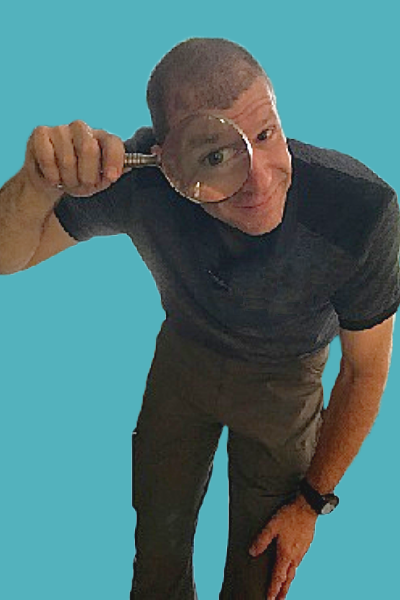In business, as in life, there’s usually a goal (or there should be a goal) behind everything we do. In the back of our minds, we should always be cognizant of the effect that our current actions could have on our ultimate objectives. If we don’t keep our eyes on the prize, those goals are going to be difficult to obtain.

It’s unfortunate, but many businesspeople have trouble looking to the future. Often, their only objective is what’s right in front their face. The British have a saying for people like this: “penny wise and pound foolish,” meaning that someone is focused so intently on the small items at hand that they fail to see the big picture and end up doing things that will hurt them in the long run.
While doing research for this article, I came across an insightful definition in the unlikeliest of places: urbandictionary.com. One of the contributors defined end game this way: “The ultimate agenda or desired consequence of a planned series of events (often elaborate and unknown to outsiders).”
While our ultimate business goals don’t have to be elaborate (although they can be), they are typically unknown to others. The important thing is that they don’t remain unknown to us.
Start with the end in mind.
Stephen R. Covey
It can be a hard thing to ponder, but we should have some idea of our ultimate goals in everything we do.
When we walk into a real estate office to start marketing, it’s pretty obvious what it is we’re doing there. We’re trying to get an agent to recommend us to their clients so we can do an inspection and make some money. And if we only look at that moment through a magnifying glass, that’s OK. We get a job, and we go back again later to try and get another one. Over and over, for our entire career.
But what if we take a step back, and examine the situation with a wide-angle lens? What if our eventual goal is to have the most successful agents in that office recommend us to all their clients? Could we plan out a long-term strategy that resulted in repeat business from high-quality agents without having to beg for every inspection that comes our way?
That would be starting with the end in mind.
When we do a home inspection, we’re obviously investigating and reporting on the pertinent items at a particular piece of property for a specific client. We input our findings into our home inspection software so that we can deliver a report to our customer and their agent. Do our job, collect our check, and move on to the next house as quickly as we can.
But what if we took some time to think about the next inspection, and the one after that, and the ones we’ll be doing in the future? What if we slowed our roll, just a bit, and thought about what we’re doing? Could we do something differently? Could we make some changes to our routine and our process that would make things flow more smoothly? Are there any changes we should make to our reporting software that would allow us to spend less time typing the same phrases over and over, or take less time jumping back and forth between sections in our report template?
What about our clients? Are there things we can do to make their finished report easier to understand, resulting in less emails, texts, and phone calls asking for clarification of our findings? Could we make some changes that make it easier for agents to utilize our reports in an efficient manner, making them more likely to refer us in the future, rather than our competitor who’s been doing it longer than us, but who’s report is much less user-friendly?
That would be starting with the end in mind.
Speaking of those homebuyers and their agents; are we content to simply interact with them once and move on to our next victim? Or should we consider the effect that our clients can have on our future success? What if we took a bit more time and made them feel more involved in the entire process? What if we followed up with them, checking in to see if they had any questions or needed any further assistance? What if we took a minute out of our busy day to stop and send that agent a thank you note? Wouldn’t those (seemingly innocuous) small actions help to cement us in their minds, making them more likely to think better of us, more likely to leave us a glowing review, and more likely to recommend our services to others in the future?
That would be starting with the end in mind.
And what about our business? Are we resigned to the fact that we’re going to keep working until they put us in the ground, or do we have hopes to one day retire or move on to something bigger and better? Do we simply keep our nose to the grindstone, slogging through one inspection after another, until one day we realize it’s all over?
What if we sat down for a minute and thought about our future? Wouldn’t it be better to have some type of plan for where we’d like to end up? We could think about branching out and hiring other inspectors. We could position ourselves to move into a specialty field, like stucco or mold inspections. We could become an educator or move into expert witness work. We could keep doing home inspections, but specialize in high-dollar homes, working less but at the same time making more money.
And what about when we’ve had enough? Are we simply going to close shop and move away, or do we have an exit plan? Have we thought about what we’re going to do with our business? We spend our whole career building a successful business, with recurring yearly revenue, but most of us never stop to thing about what’s gonna happen to it when we hang up our tool belt. Are we planning on passing it along to our children? Is there a chance that we could sell it, padding our retirement account? Or do we simply shut the doors and move on, letting all our hard work go for naught?

And if we think we’ll be able to sell it, do we have a plan for that? Do we simply imagine that someone will be naive enough to buy a business based on our relationships and let us (the whole reason for the business’ success) walk right out the door? Are we hoping to sell it to an employee? If so, do we have a plan to ensure that this employee is invested in our company, so they’ll be likely to pay us for it rather that simply walking away with all our clients when they start their own thing?
That would be starting with the end in mind.
It’s not easy to think about the future. We’ve already got enough on our plate now, juggling our lives, our family obligations, our business, and everything else we’ve got going on. We’ve already got enough plates in the air without adding even more things to our overloaded schedule. But if we leave our future to chance, if we neglect to look ahead, if we don’t work with one eye on our end game, we’ll have no one but ourselves to blame when things don’t turn out the way we hoped.
Start with the end in mind. Things hardly ever turn out exactly the way we plan, but it’s often a whole lot better than having no plan at all.
Would you like to get an email every Friday where we share the newest things we’ve discovered about home inspections? CLICK HERE to sign up.
Want to be an Influencer in Your Field? Share This Post!
Thanks, Joe


